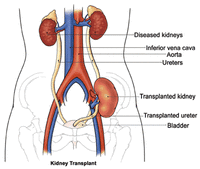-
Posted by
Hasina Akhtar Nigar March 1, 2019 -
Filed in
Health
-
## health
-
3,748 views
Protect Your Kidneys and Save Your Heart
The World Kidney on the second Thursday of March since 2006, established by two organizations, the International Federation of Kidney Foundations and the International Society of Nephrology, to raise awareness of kidney diseases, especially chronic kidney disease (CKD).
As kidney diseases may not lead to noticeable symptoms until late, it is important to know the risk factors and be tested regularly.
people in over 100 countries will be reflecting on kidney diseases and kidney health and so World Kidney Day is a day to celebrate.
Chronic Kidney Disease and Cardiovascular Disease and the fact that Chronic Kidney Disease is a major risk for Cardiovascular Disease. So Protect Your Kidneys and Save Your Heart.
The Day caries significance for the people of Bangladesh as the number of kidney patients here is also on rise like many other countries around the world.
Statistics from different sources show that around 20 percent of the total global population is now affected by kidney aliment. The alarming information is that 18 percent people in Bangladesh are affected by the disease when it is 11 percent in USA and 15 percent in Australia .
The statistics indicate that the disease poses serious health risk to people irrespective of their country status.
In Bangladesh around 1.80 crore people here are being affected by kidney disease ever year, of which 30,000 die.
Many of affected people are also dying later for stroke or heart failure after getting dialysis for a longer term.
The main reasons for the disease include high blood pressure, diabetes and nephritis. One in every three diabetic patient in Bangladesh eventually suffers from kidney disease.
Besides, a good number of kidney patients also develop hearth ailment or suffer stroke in later stage.That's Why Protect your Kidneys and Save Your Heart.
In that case people regular exercise, avoid fatty food and develop a healthy living style to protect their kidneys.
Writen by - Hasina Akhtar nigar

